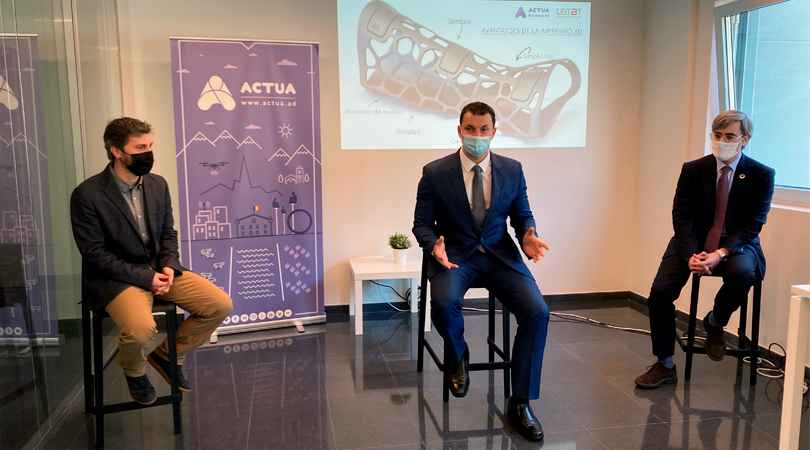The Minister for Presidency, Economy and Enterprise for the Government of Andorra and president of Actua Innovation, Jordi Gallardo, and the general director of Leitat, Jordi Rodríguez, signed, on Monday in Andorra la Vella, an agreement to collectively study the potential of 4.0 industry in the territory.
The agreement will allow collaboration between the Technological center and the Andorran administration in investigation and development projects (I+D), given Leitat´s leadership in this field, and the putting into practice of initiatives Connected to 4.0 industry. Specifically, in the last few years, Leitat has launched initiatives linked to 3D printing in order to develop the adoption and use of this technology as a production tool in the industry sector: the IAM 3D Hub and the 3D Factory Incubator.
Gallardo highlighted “the collaboration will provide an analysis of the 4.0 industry´s potential in current and traditional sectors of the Andorran economy as well as the possibility of these technologies to be a support for new diversification sectors”, and he added that “simultaneously they will analyze the creation of an antennae of the DFactory in Andorra to provide support to the adopting of these technologies or the articulation of services to the ecosystem of Innovation, Business and Research in Andorra”.
Advantages of 3D Printing
In turn, Jordi Rodríguez, explained that “Printing in 3D or additive manufacturing is a disruptive type of technology, and among other advantages, is characterized by its versatility when it comes to the design of pieces of complex geometry or combining different pieces in a single product and facilitates personalized and short production runs, according to the market´s demands”.
Equally and as proven during the start of the pandemic, 3D printing eliminates entry barriers into re-industrialization and reduces production and market access times for final products.
In this sense, the director of Actua Innovation, Marc Pons, pointed out that “the transversality of this technology allows its use in multiple sectors: from food, medicine, manufacturing of sports material, electronics, to consumer goods or construction. Nevertheless, the first to adopt 3D printing have been mobility companies (automobiles, trains or aerospace ones), health (especially in prosthetics) and tool companies”.
Leitat, a reference in technology
Leitat, founded in 1906, has the mission of Managing Technologies to create and transfer sustainable value to Societal, Environmental, Economic and Industrial companies and entities, through research and technological process. From our state of the art installations we are collaborating with over 45 countries and developing over 215 projects in the fields of: Biotech, Health, Advanced Materials, Industrial Chemistry, Renewable Energies and New Production Processes.
At the end of 2017, Leitat launched, in collaboration with leading companies from the sector, the IAM 3D Hub, an initiative whose aim is to promote the adoption of additive manufacturing technologies within the European industrial sector.
In 2019 the 3D Factory Incubator was born, the first incubator of other technologies in 3D printing. In this case, the project´s goal is to incubate the 100 best start-ups connected to printing in 3D, by giving access to unique installations in Europe of 1.000 m2. Despite the eruption of the pandemic, the 3D Factory Incubator has surpassed all expectations in its first two years of exitance, with over 55 companies incubated.
The success of this project propelled the development of the future DFactory Barcelona, the center by excellence of the 4.0 industry. The project, which is also supported by the Consorci de la Zona Franca de Barcelona, will allow the creation of an ecosystem promoting the impulse of 4.0 technologies (robotics, sensorial, artificial intelligence, cybersecurity and 3D printing, among others) for the transformation of European industry. DFactory Barcelona is projected to start its activity at the end of summer 2021 with a 17.000 m2 building located in Barcelona, where laboratories and businesses linked to 4.0 technologies from all over Europe will co-exist. The second phase, which will reach 100.000 m2, is already under process of tender.

